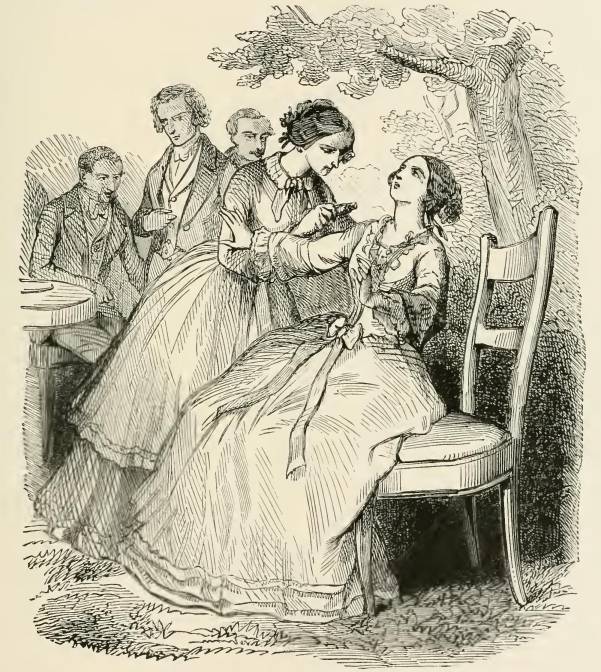


Monte Cristo felt the arm of Madame Danglars stiffen, while that of Villefort trembled.
“A newly born infant,” repeated Debray; “this affair becomes serious!”
“Well,” said Château-Renaud, “I was not wrong just now then, when I said that houses had souls and faces like men, and that their exteriors carried the impress of their characters. This house was gloomy because it was remorseful: it was remorseful because it concealed a crime.”
“Who said it was a crime?” asked Villefort, with a last effort.
“How? is it not a crime to bury a living child in a garden?” cried Monte Cristo. “And pray what do you call such an action?”
“But who said it was buried alive?”
“Why bury it there if it were dead? This garden has never been a cemetery.”
“What is done to infanticides in this country?” asked Major Cavalcanti innocently.
“Oh, their heads are soon cut off,” said Danglars.
“Ah, indeed?” said Cavalcanti.
“I think so; am I not right, M. de Villefort?” asked Monte Cristo.
“Yes, count,” replied Villefort, in a voice now scarcely human.
Monte Cristo, seeing that the two persons for whom he had prepared this scene could scarcely endure it, and not wishing to carry it too far, said:
“Come, gentlemen,—some coffee, we seem to have forgotten it,” and he conducted the guests back to the table on the lawn.
“Indeed, count,” said Madame Danglars, “I am ashamed to own it, but all your frightful stories have so upset me, that I must beg you to let me sit down;” and she fell into a chair.
Monte Cristo bowed, and went to Madame de Villefort.
“I think Madame Danglars again requires your bottle,” he said. But before Madame de Villefort could reach her friend, the procureur had found time to whisper to Madame Danglars, “I must speak to you.”
“When?”
“Tomorrow.”
“Where?”
“In my office, or in the court, if you like,—that is the surest place.”
“I will be there.”
At this moment Madame de Villefort approached.
“Thanks, my dear friend,” said Madame Danglars, trying to smile; “it is over now, and I am much better.”
The evening passed on; Madame de Villefort expressed a desire to return to Paris, which Madame Danglars had not dared to do, notwithstanding the uneasiness she experienced. On his wife’s request, M. de Villefort was the first to give the signal of departure. He offered a seat in his landau to Madame Danglars, that she might be under the care of his wife. As for M. Danglars, absorbed in an interesting conversation with M. Cavalcanti, he paid no attention to anything that was passing. While Monte Cristo had begged the smelling-bottle of Madame de Villefort, he had noticed the approach of Villefort to Madame Danglars, and he soon guessed all that had passed between them, though the words had been uttered in so low a voice as hardly to be heard by Madame Danglars. Without opposing their arrangements, he allowed Morrel, Château-Renaud, and Debray to leave on horseback, and the ladies in M. de Villefort’s carriage. Danglars, more and more delighted with Major Cavalcanti, had offered him a seat in his carriage. Andrea Cavalcanti found his tilbury waiting at the door; the groom, in every respect a caricature of the English fashion, was standing on tiptoe to hold a large iron-gray horse.
Andrea had spoken very little during dinner; he was an intelligent lad, and he feared to utter some absurdity before so many grand people, amongst whom, with dilating eyes, he saw the king’s attorney. Then he had been seized upon by Danglars, who, with a rapid glance at the stiff-necked old major and his modest son, and taking into consideration the hospitality of the count, made up his mind that he was in the society of some nabob come to Paris to finish the worldly education of his heir. He contemplated with unspeakable delight the large diamond which shone on the major’s little finger; for the major, like a prudent man, in case of any accident happening to his bank-notes, had immediately converted them into an available asset. Then, after dinner, on the pretext of business, he questioned the father and son upon their mode of living; and the father and son, previously informed that it was through Danglars the one was to receive his 48,000 francs and the other 50,000 livres annually, were so full of affability that they would have shaken hands even with the banker’s servants, so much did their gratitude need an object to expend itself upon.
One thing above all the rest heightened the respect, nay almost the veneration, of Danglars for Cavalcanti. The latter, faithful to the principle of Horace, nil admirari, had contented himself with showing his knowledge by declaring in what lake the best lampreys were caught. Then he had eaten some without saying a word more; Danglars, therefore, concluded that such luxuries were common at the table of the illustrious descendant of the Cavalcanti, who most likely in Lucca fed upon trout brought from Switzerland, and lobsters sent from England, by the same means used by the count to bring the lampreys from Lake Fusaro, and the sterlet from the Volga. Thus it was with much politeness of manner that he heard Cavalcanti pronounce these words:
“Tomorrow, sir, I shall have the honor of waiting upon you on business.”
“And I, sir,” said Danglars, “shall be most happy to receive you.”
Upon which he offered to take Cavalcanti in his carriage to the Hôtel des Princes, if it would not be depriving him of the company of his son. To this Cavalcanti replied by saying that for some time past his son had lived independently of him, that he had his own horses and carriages, and that not having come together, it would not be difficult for them to leave separately. The major seated himself, therefore, by the side of Danglars, who was more and more charmed with the ideas of order and economy which ruled this man, and yet who, being able to allow his son 60,000 francs a year, might be supposed to possess a fortune of 500,000 or 600,000 livres.
As for Andrea, he began, by way of showing off, to scold his groom, who, instead of bringing the tilbury to the steps of the house, had taken it to the outer door, thus giving him the trouble of walking thirty steps to reach it. The groom heard him with humility, took the bit of the impatient animal with his left hand, and with the right held out the reins to Andrea, who, taking them from him, rested his polished boot lightly on the step.
At that moment a hand touched his shoulder. The young man turned round, thinking that Danglars or Monte Cristo had forgotten something they wished to tell him, and had returned just as they were starting. But instead of either of these, he saw nothing but a strange face, sunburnt, and encircled by a beard, with eyes brilliant as carbuncles, and a smile upon the mouth which displayed a perfect set of white teeth, pointed and sharp as the wolf’s or jackal’s. A red handkerchief encircled his gray head; torn and filthy garments covered his large bony limbs, which seemed as though, like those of a skeleton, they would rattle as he walked; and the hand with which he leaned upon the young man’s shoulder, and which was the first thing Andrea saw, seemed of gigantic size.
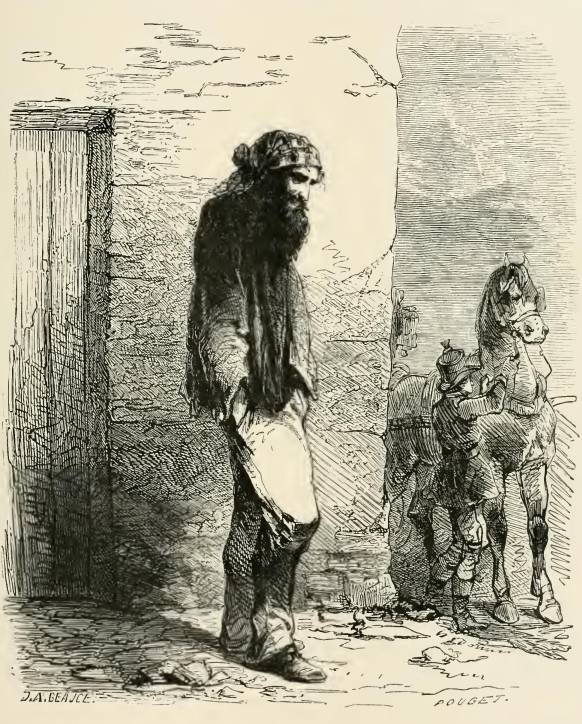

Did the young man recognize that face by the light of the lantern in his tilbury, or was he merely struck with the horrible appearance of his interrogator? We cannot say; but only relate the fact that he shuddered and stepped back suddenly.
“What do you want of me?” he asked.
“Pardon me, my friend, if I disturb you,” said the man with the red handkerchief, “but I want to speak to you.”
“You have no right to beg at night,” said the groom, endeavoring to rid his master of the troublesome intruder.
“I am not begging, my fine fellow,” said the unknown to the servant, with so ironical an expression of the eye, and so frightful a smile, that he withdrew; “I only wish to say two or three words to your master, who gave me a commission to execute about a fortnight ago.”
“Come,” said Andrea, with sufficient nerve for his servant not to perceive his agitation, “what do you want? Speak quickly, friend.”
The man said, in a low voice: “I wish—I wish you to spare me the walk back to Paris. I am very tired, and as I have not eaten so good a dinner as you, I can scarcely stand.”
The young man shuddered at this strange familiarity.
“Tell me,” he said—“tell me what you want?”
“Well, then, I want you to take me up in your fine carriage, and carry me back.” Andrea turned pale, but said nothing.
“Yes,” said the man, thrusting his hands into his pockets, and looking impudently at the youth; “I have taken the whim into my head; do you understand, Master Benedetto?”
At this name, no doubt, the young man reflected a little, for he went towards his groom, saying:
“This man is right; I did indeed charge him with a commission, the result of which he must tell me; walk to the barrier, there take a cab, that you may not be too late.”
The surprised groom retired.
“Let me at least reach a shady spot,” said Andrea.
“Oh, as for that, I’ll take you to a splendid place,” said the man with the handkerchief; and taking the horse’s bit he led the tilbury where it was certainly impossible for anyone to witness the honor that Andrea conferred upon him.
“Don’t think I want the glory of riding in your fine carriage,” said he; “oh, no, it’s only because I am tired, and also because I have a little business to talk over with you.”
“Come, step in,” said the young man. It was a pity this scene had not occurred in daylight, for it was curious to see this rascal throwing himself heavily down on the cushion beside the young and elegant driver of the tilbury. Andrea drove past the last house in the village without saying a word to his companion, who smiled complacently, as though well-pleased to find himself travelling in so comfortable a vehicle. Once out of Auteuil, Andrea looked around, in order to assure himself that he could neither be seen nor heard, and then, stopping the horse and crossing his arms before the man, he asked:
“Now, tell me why you come to disturb my tranquillity?”
“Let me ask you why you deceived me?”
“How have I deceived you?”
“‘How,’ do you ask? When we parted at the Pont du Var, you told me you were going to travel through Piedmont and Tuscany; but instead of that, you come to Paris.”
“How does that annoy you?”
“It does not; on the contrary, I think it will answer my purpose.”
“So,” said Andrea, “you are speculating upon me?”
“What fine words he uses!”
“I warn you, Master Caderousse, that you are mistaken.”
“Well, well, don’t be angry, my boy; you know well enough what it is to be unfortunate; and misfortunes make us jealous. I thought you were earning a living in Tuscany or Piedmont by acting as facchino or cicerone, and I pitied you sincerely, as I would a child of my own. You know I always did call you my child.”
“Come, come, what then?”
“Patience—patience!”
“I am patient, but go on.”
“All at once I see you pass through the barrier with a groom, a tilbury, and fine new clothes. You must have discovered a mine, or else become a stockbroker.”
“So that, as you confess, you are jealous?”
“No, I am pleased—so pleased that I wished to congratulate you; but as I am not quite properly dressed, I chose my opportunity, that I might not compromise you.”
“Yes, and a fine opportunity you have chosen!” exclaimed Andrea; “you speak to me before my servant.”
“How can I help that, my boy? I speak to you when I can catch you. You have a quick horse, a light tilbury, you are naturally as slippery as an eel; if I had missed you tonight, I might not have had another chance.”
“You see, I do not conceal myself.”
“You are lucky; I wish I could say as much, for I do conceal myself; and then I was afraid you would not recognize me, but you did,” added Caderousse with his unpleasant smile. “It was very polite of you.”
“Come,” said Andrea, “what do you want?”
“You do not speak affectionately to me, Benedetto, my old friend, that is not right—take care, or I may become troublesome.”
This menace smothered the young man’s passion. He urged the horse again into a trot.
“You should not speak so to an old friend like me, Caderousse, as you said just now; you are a native of Marseilles, I am——”
“Do you know then now what you are?”
“No, but I was brought up in Corsica; you are old and obstinate, I am young and wilful. Between people like us threats are out of place, everything should be amicably arranged. Is it my fault if fortune, which has frowned on you, has been kind to me?”
“Fortune has been kind to you, then? Your tilbury, your groom, your clothes, are not then hired? Good, so much the better,” said Caderousse, his eyes sparkling with avarice.
“Oh, you knew that well enough before speaking to me,” said Andrea, becoming more and more excited. “If I had been wearing a handkerchief like yours on my head, rags on my back, and worn-out shoes on my feet, you would not have known me.”
“You wrong me, my boy; now I have found you, nothing prevents my being as well-dressed as anyone, knowing, as I do, the goodness of your heart. If you have two coats you will give me one of them. I used to divide my soup and beans with you when you were hungry.”
“True,” said Andrea.
“What an appetite you used to have! Is it as good now?”
“Oh, yes,” replied Andrea, laughing.
“How did you come to be dining with that prince whose house you have just left?”
“He is not a prince; simply a count.”
“A count, and a rich one too, eh?”
“Yes; but you had better not have anything to say to him, for he is not a very good-tempered gentleman.”
“Oh, be easy! I have no design upon your count, and you shall have him all to yourself. But,” said Caderousse, again smiling with the disagreeable expression he had before assumed, “you must pay for it—you understand?”
“Well, what do you want?”
“I think that with a hundred francs a month——”
“Well?”
“I could live——”
“Upon a hundred francs!”
“Come—you understand me; but that with——”
“With?”
“With a hundred and fifty francs I should be quite happy.”
“Here are two hundred,” said Andrea; and he placed ten gold louis in the hand of Caderousse.
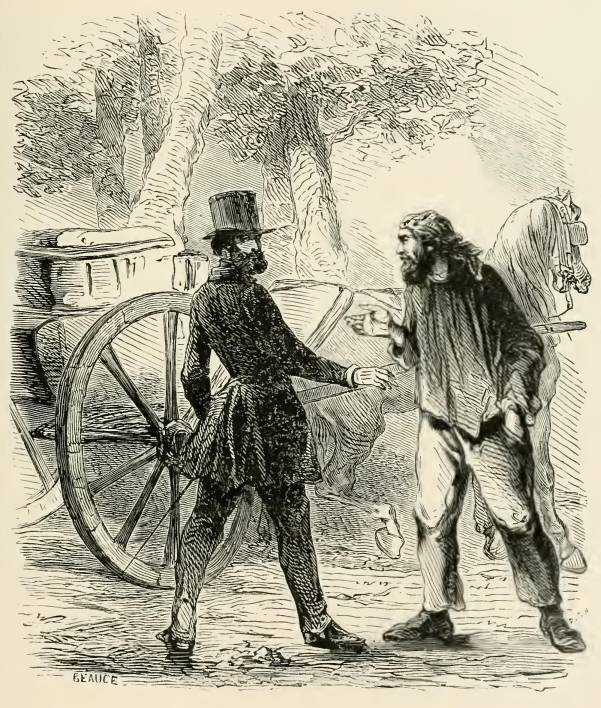

“Good!” said Caderousse.
“Apply to the steward on the first day of every month, and you will receive the same sum.”
“There now, again you degrade me.”
“How so?”
“By making me apply to the servants, when I want to transact business with you alone.”
“Well, be it so, then. Take it from me then, and so long at least as I receive my income, you shall be paid yours.”
“Come, come; I always said you were a fine fellow, and it is a blessing when good fortune happens to such as you. But tell me all about it?”
“Why do you wish to know?” asked Cavalcanti.
“What? do you again defy me?”
“No; the fact is, I have found my father.”
“What? a real father?”
“Yes, so long as he pays me——”
“You’ll honor and believe him—that’s right. What is his name?”
“Major Cavalcanti.”
“Is he pleased with you?”
“So far I have appeared to answer his purpose.”
“And who found this father for you?”
“The Count of Monte Cristo.”
“The man whose house you have just left?”
“Yes.”
“I wish you would try and find me a situation with him as grandfather, since he holds the money-chest!”
“Well, I will mention you to him. Meanwhile, what are you going to do?”
“I?”
“Yes, you.”
“It is very kind of you to trouble yourself about me.”
“Since you interest yourself in my affairs, I think it is now my turn to ask you some questions.”
“Ah, true. Well; I shall rent a room in some respectable house, wear a decent coat, shave every day, and go and read the papers in a café. Then, in the evening, I shall go to the theatre; I shall look like some retired baker. That is what I want.”
“Come, if you will only put this scheme into execution, and be steady, nothing could be better.”
“Do you think so, M. Bossuet? And you—what will you become? A peer of France?”
“Ah,” said Andrea, “who knows?”
“Major Cavalcanti is already one, perhaps; but then, hereditary rank is abolished.”
“No politics, Caderousse. And now that you have all you want, and that we understand each other, jump down from the tilbury and disappear.”
“Not at all, my good friend.”
“How? Not at all?”
“Why, just think for a moment; with this red handkerchief on my head, with scarcely any shoes, no papers, and ten gold napoleons in my pocket, without reckoning what was there before—making in all about two hundred francs,—why, I should certainly be arrested at the barriers. Then, to justify myself, I should say that you gave me the money; this would cause inquiries, it would be found that I left Toulon without giving due notice, and I should then be escorted back to the shores of the Mediterranean. Then I should become simply No. 106, and good-bye to my dream of resembling the retired baker! No, no, my boy; I prefer remaining honorably in the capital.”
Andrea scowled. Certainly, as he had himself owned, the reputed son of Major Cavalcanti was a wilful fellow. He drew up for a minute, threw a rapid glance around him, and then his hand fell instantly into his pocket, where it began playing with a pistol. But, meanwhile, Caderousse, who had never taken his eyes off his companion, passed his hand behind his back, and opened a long Spanish knife, which he always carried with him, to be ready in case of need. The two friends, as we see, were worthy of and understood one another. Andrea’s hand left his pocket inoffensively, and was carried up to the red moustache, which it played with for some time.
“Good Caderousse,” he said, “how happy you will be.”
“I will do my best,” said the innkeeper of the Pont du Gard, shutting up his knife.
“Well, then, we will go into Paris. But how will you pass through the barrier without exciting suspicion? It seems to me that you are in more danger riding than on foot.”
“Wait,” said Caderousse, “we shall see.” He then took the greatcoat with the large collar, which the groom had left behind in the tilbury, and put it on his back; then he took off Cavalcanti’s hat, which he placed upon his own head, and finally he assumed the careless attitude of a servant whose master drives himself.
“But, tell me,” said Andrea, “am I to remain bareheaded?”
“Pooh,” said Caderousse; “it is so windy that your hat can easily appear to have blown off.”
“Come, come; enough of this,” said Cavalcanti.
“What are you waiting for?” said Caderousse. “I hope I am not the cause.”
“Hush,” said Andrea. They passed the barrier without accident. At the first cross street Andrea stopped his horse, and Caderousse leaped out.
“Well!” said Andrea,—“my servant’s coat and my hat?”
“Ah,” said Caderousse, “you would not like me to risk taking cold?”
“But what am I to do?”
“You? Oh, you are young while I am beginning to get old. Au revoir, Benedetto;” and running into a court, he disappeared.
“Alas,” said Andrea, sighing, “one cannot be completely happy in this world!”
At the Place Louis XV. the three young people separated—that is to say, Morrel went to the Boulevards, Château-Renaud to the Pont de la Révolution, and Debray to the Quai. Most probably Morrel and Château-Renaud returned to their “domestic hearths,” as they say in the gallery of the Chamber in well-turned speeches, and in the theatre of the Rue Richelieu in well-written pieces; but it was not the case with Debray. When he reached the wicket of the Louvre, he turned to the left, galloped across the Carrousel, passed through the Rue Saint-Roch, and, issuing from the Rue de la Michodière, he arrived at M. Danglars’ door just at the same time that Villefort’s landau, after having deposited him and his wife at the Faubourg Saint-Honoré, stopped to leave the baroness at her own house.
Debray, with the air of a man familiar with the house, entered first into the court, threw his bridle into the hands of a footman, and returned to the door to receive Madame Danglars, to whom he offered his arm, to conduct her to her apartments. The gate once closed, and Debray and the baroness alone in the court, he asked:
“What was the matter with you, Hermine? and why were you so affected at that story, or rather fable, which the count related?”
“Because I have been in such shocking spirits all the evening, my friend,” said the baroness.
“No, Hermine,” replied Debray; “you cannot make me believe that; on the contrary, you were in excellent spirits when you arrived at the count’s. M. Danglars was disagreeable, certainly, but I know how much you care for his ill-humor. Someone has vexed you; I will allow no one to annoy you.”
“You are deceived, Lucien, I assure you,” replied Madame Danglars; “and what I have told you is really the case, added to the ill-humor you remarked, but which I did not think it worth while to allude to.”
It was evident that Madame Danglars was suffering from that nervous irritability which women frequently cannot account for even to themselves; or that, as Debray had guessed, she had experienced some secret agitation that she would not acknowledge to anyone. Being a man who knew that the former of these symptoms was one of the inherent penalties of womanhood, he did not then press his inquiries, but waited for a more appropriate opportunity when he should again interrogate her, or receive an avowal proprio motu.
At the door of her apartment the baroness met Mademoiselle Cornélie, her confidential maid.
“What is my daughter doing?” asked Madame Danglars.
“She practiced all the evening, and then went to bed,” replied Mademoiselle Cornélie.
“Yet I think I hear her piano.”
“It is Mademoiselle Louise d’Armilly, who is playing while Mademoiselle Danglars is in bed.”
“Well,” said Madame Danglars, “come and undress me.”
They entered the bedroom. Debray stretched himself upon a large couch, and Madame Danglars passed into her dressing-room with Mademoiselle Cornélie.
“My dear M. Lucien,” said Madame Danglars through the door, “you are always complaining that Eugénie will not address a word to you.”
“Madame,” said Lucien, playing with a little dog, who, recognizing him as a friend of the house, expected to be caressed, “I am not the only one who makes similar complaints, I think I heard Morcerf say that he could not extract a word from his betrothed.”
“True,” said Madame Danglars; “yet I think this will all pass off, and that you will one day see her enter your study.”
“My study?”
“At least that of the minister.”
“Why so!”
“To ask for an engagement at the Opera. Really, I never saw such an infatuation for music; it is quite ridiculous for a young lady of fashion.”
Debray smiled. “Well,” said he, “let her come, with your consent and that of the baron, and we will try and give her an engagement, though we are very poor to pay such talent as hers.”
“Go, Cornélie,” said Madame Danglars, “I do not require you any longer.”
Cornélie obeyed, and the next minute Madame Danglars left her room in a charming loose dress, and came and sat down close to Debray. Then she began thoughtfully to caress the little spaniel. Lucien looked at her for a moment in silence.
“Come, Hermine,” he said, after a short time, “answer candidly,—something vexes you—is it not so?”
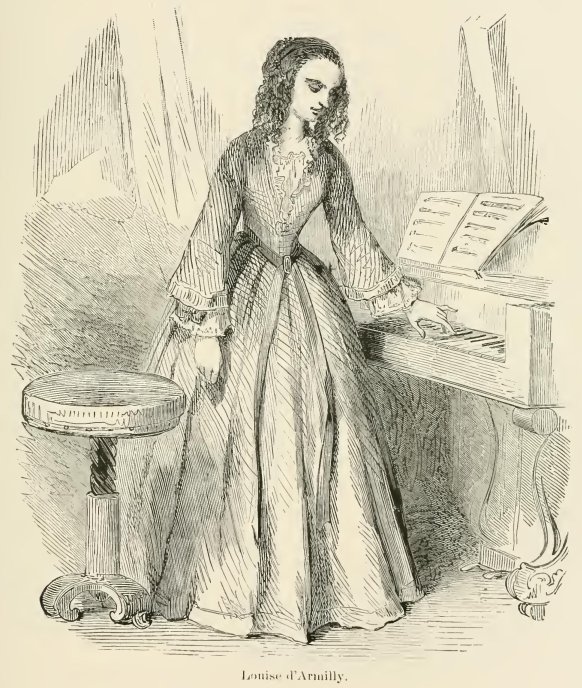

“Nothing,” answered the baroness.
And yet, as she could scarcely breathe, she rose and went towards a looking-glass. “I am frightful tonight,” she said. Debray rose, smiling, and was about to contradict the baroness upon this latter point, when the door opened suddenly. M. Danglars appeared; Debray reseated himself. At the noise of the door Madame Danglars turned round, and looked upon her husband with an astonishment she took no trouble to conceal.
“Good-evening, madame,” said the banker; “good-evening, M. Debray.”
Probably the baroness thought this unexpected visit signified a desire to make up for the sharp words he had uttered during the day. Assuming a dignified air, she turned round to Debray, without answering her husband.
“Read me something, M. Debray,” she said. Debray, who was slightly disturbed at this visit, recovered himself when he saw the calmness of the baroness, and took up a book marked by a mother-of-pearl knife inlaid with gold.
“Excuse me,” said the banker, “but you will tire yourself, baroness, by such late hours, and M. Debray lives some distance from here.”
Debray was petrified, not only to hear Danglars speak so calmly and politely, but because it was apparent that beneath outward politeness there really lurked a determined spirit of opposition to anything his wife might wish to do. The baroness was also surprised, and showed her astonishment by a look which would doubtless have had some effect upon her husband if he had not been intently occupied with the paper, where he was looking to see the closing stock quotations. The result was, that the proud look entirely failed of its purpose.
“M. Lucien,” said the baroness, “I assure you I have no desire to sleep, and that I have a thousand things to tell you this evening, which you must listen to, even though you slept while hearing me.”
“I am at your service, madame,” replied Lucien coldly.
“My dear M. Debray,” said the banker, “do not kill yourself tonight listening to the follies of Madame Danglars, for you can hear them as well tomorrow; but I claim tonight and will devote it, if you will allow me, to talk over some serious matters with my wife.”
This time the blow was so well aimed, and hit so directly, that Lucien and the baroness were staggered, and they interrogated each other with their eyes, as if to seek help against this aggression, but the irresistible will of the master of the house prevailed, and the husband was victorious.
“Do not think I wish to turn you out, my dear Debray,” continued Danglars; “oh, no, not at all. An unexpected occurrence forces me to ask my wife to have a little conversation with me; it is so rarely I make such a request, I am sure you cannot grudge it to me.”
Debray muttered something, bowed and went out, knocking himself against the edge of the door, like Nathan in Athalie.
“It is extraordinary,” he said, when the door was closed behind him, “how easily these husbands, whom we ridicule, gain an advantage over us.”
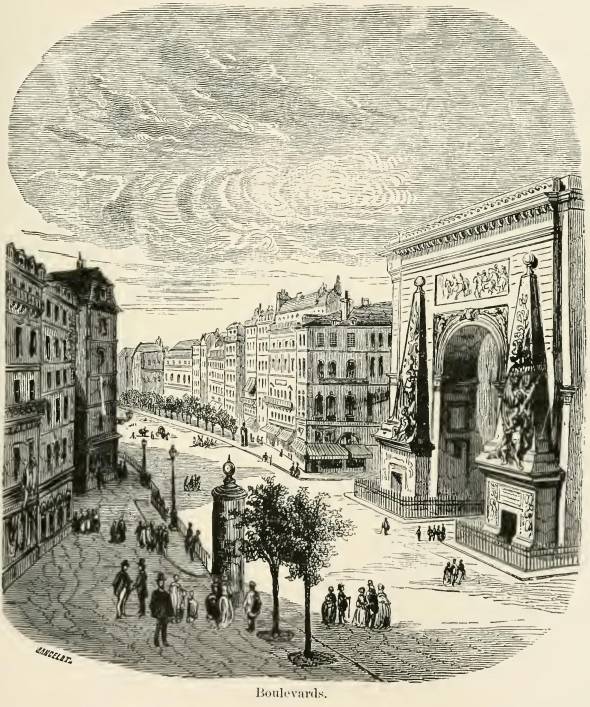

Lucien having left, Danglars took his place on the sofa, closed the open book, and placing himself in a dreadfully dictatorial attitude, he began playing with the dog; but the animal, not liking him as well as Debray, and attempting to bite him, Danglars seized him by the skin of his neck and threw him upon a couch on the other side of the room. The animal uttered a cry during the transit, but, arrived at its destination, it crouched behind the cushions, and stupefied at such unusual treatment remained silent and motionless.
“Do you know, sir,” asked the baroness, “that you are improving? Generally you are only rude, but tonight you are brutal.”
“It is because I am in a worse humor than usual,” replied Danglars. Hermine looked at the banker with supreme disdain. These glances frequently exasperated the pride of Danglars, but this evening he took no notice of them.
“And what have I to do with your ill-humor?” said the baroness, irritated at the impassibility of her husband; “do these things concern me? Keep your ill-humor at home in your money boxes, or, since you have clerks whom you pay, vent it upon them.”
“Not so,” replied Danglars; “your advice is wrong, so I shall not follow it. My money boxes are my Pactolus, as, I think, M. Demoustier says, and I will not retard its course, or disturb its calm. My clerks are honest men, who earn my fortune, whom I pay much below their deserts, if I may value them according to what they bring in; therefore I shall not get into a passion with them; those with whom I will be in a passion are those who eat my dinners, mount my horses, and exhaust my fortune.”
“And pray who are the persons who exhaust your fortune? Explain yourself more clearly, I beg, sir.”
“Oh, make yourself easy!—I am not speaking riddles, and you will soon know what I mean. The people who exhaust my fortune are those who draw out 700,000 francs in the course of an hour.”
“I do not understand you, sir,” said the baroness, trying to disguise the agitation of her voice and the flush of her face.
“You understand me perfectly, on the contrary,” said Danglars: “but, if you will persist, I will tell you that I have just lost 700,000 francs upon the Spanish loan.”
“And pray,” asked the baroness, “am I responsible for this loss?”
“Why not?”
“Is it my fault you have lost 700,000 francs?”
“Certainly it is not mine.”
“Once for all, sir,” replied the baroness sharply, “I tell you I will not hear cash named; it is a style of language I never heard in the house of my parents or in that of my first husband.”
“Oh, I can well believe that, for neither of them was worth a penny.”
“The better reason for my not being conversant with the slang of the bank, which is here dinning in my ears from morning to night; that noise of jingling crowns, which are constantly being counted and re-counted, is odious to me. I only know one thing I dislike more, which is the sound of your voice.”
“Really?” said Danglars. “Well, this surprises me, for I thought you took the liveliest interest in all my affairs!”
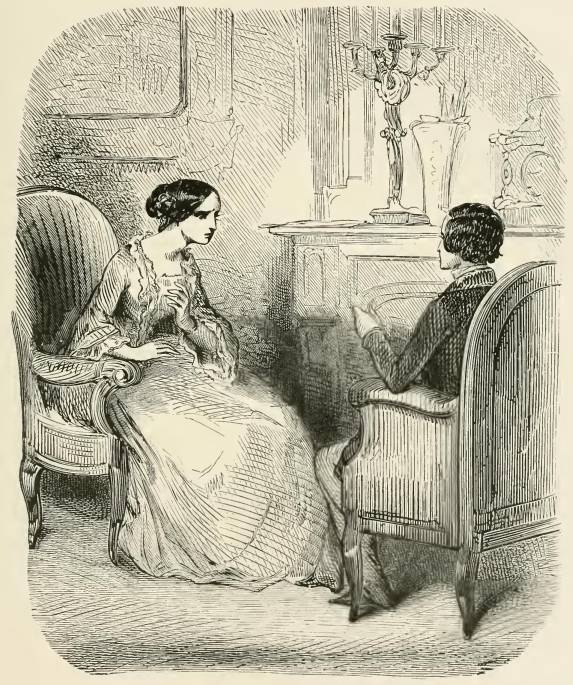

“I? What could put such an idea into your head?”
“Yourself.”
“Ah?—what next?”
“Most assuredly.”
“I should like to know upon what occasion?”
“Oh, mon Dieu! that is very easily done. Last February you were the first who told me of the Haitian funds. You had dreamed that a ship had entered the harbor at Le Havre, that this ship brought news that a payment we had looked upon as lost was going to be made. I know how clear-sighted your dreams are; I therefore purchased immediately as many shares as I could of the Haitian debt, and I gained 400,000 francs by it, of which 100,000 have been honestly paid to you. You spent it as you pleased; that was your business. In March there was a question about a grant to a railway. Three companies presented themselves, each offering equal securities. You told me that your instinct,—and although you pretend to know nothing about speculations, I think on the contrary, that your comprehension is very clear upon certain affairs,—well, you told me that your instinct led you to believe the grant would be given to the company called the Southern. I bought two thirds of the shares of that company; as you had foreseen, the shares trebled in value, and I picked up a million, from which 250,000 francs were paid to you for pin-money. How have you spent this 250,000 francs?—it is no business of mine.”
“When are you coming to the point?” cried the baroness, shivering with anger and impatience.
“Patience, madame, I am coming to it.”
“That’s fortunate.”
“In April you went to dine at the minister’s. You heard a private conversation respecting Spanish affairs—on the expulsion of Don Carlos. I bought some Spanish shares. The expulsion took place and I pocketed 600,000 francs the day Charles V. repassed the Bidassoa. Of these 600,000 francs you took 50,000 crowns. They were yours, you disposed of them according to your fancy, and I asked no questions; but it is not the less true that you have this year received 500,000 livres.”
“Well, sir, and what then?”
“Ah, yes, it was just after this that you spoiled everything.”
“Really, your manner of speaking——”
“It expresses my meaning, and that is all I want. Well, three days after that you talked politics with M. Debray, and you fancied from his words that Don Carlos had returned to Spain. Well, I sold my shares, the news got out, and I no longer sold—I gave them away, next day I find the news was false, and by this false report I have lost 700,000 francs.”
“Well?”
“Well, since I gave you a fourth of my gains, I think you owe me a fourth of my losses; the fourth of 700,000 francs is 175,000 francs.”
“What you say is absurd, and I cannot see why M. Debray’s name is mixed up in this affair.”
“Because if you do not possess the 175,000 francs I reclaim, you must have lent them to your friends, and M. Debray is one of your friends.”
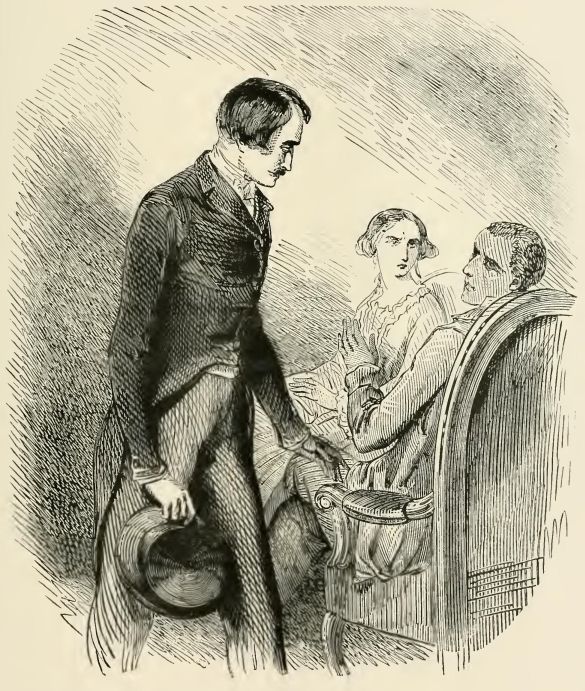

“For shame!” exclaimed the baroness.
“Oh, let us have no gestures, no screams, no modern drama, or you will oblige me to tell you that I see Debray leave here, pocketing the whole of the 500,000 livres you have handed over to him this year, while he smiles to himself, saying that he has found what the most skilful players have never discovered—that is, a roulette where he wins without playing, and is no loser when he loses.”
The baroness became enraged.
“Wretch!” she cried, “will you dare to tell me you did not know what you now reproach me with?”
“I do not say that I did know it, and I do not say that I did not know it. I merely tell you to look into my conduct during the last four years that we have ceased to be husband and wife, and see whether it has not always been consistent. Some time after our rupture, you wished to study music, under the celebrated baritone who made such a successful appearance at the Théâtre Italien; at the same time I felt inclined to learn dancing of the danseuse who acquired such a reputation in London. This cost me, on your account and mine, 100,000 francs. I said nothing, for we must have peace in the house; and 100,000 francs for a lady and gentleman to be properly instructed in music and dancing are not too much. Well, you soon become tired of singing, and you take a fancy to study diplomacy with the minister’s secretary. You understand, it signifies nothing to me so long as you pay for your lessons out of your own cash box. But today I find you are drawing on mine, and that your apprenticeship may cost me 700,000 francs per month. Stop there, madame, for this cannot last. Either the diplomatist must give his lessons gratis, and I will tolerate him, or he must never set his foot again in my house;—do you understand, madame?”
“Oh, this is too much,” cried Hermine, choking, “you are worse than despicable.”
“But,” continued Danglars, “I find you did not even pause there——”
“Insults!”
“You are right; let us leave these facts alone, and reason coolly. I have never interfered in your affairs excepting for your good; treat me in the same way. You say you have nothing to do with my cash box. Be it so. Do as you like with your own, but do not fill or empty mine. Besides, how do I know that this was not a political trick, that the minister enraged at seeing me in the opposition, and jealous of the popular sympathy I excite, has not concerted with M. Debray to ruin me?”
“A probable thing!”
“Why not? Who ever heard of such an occurrence as this?—a false telegraphic despatch—it is almost impossible for wrong signals to be made as they were in the last two telegrams. It was done on purpose for me—I am sure of it.”
“Sir,” said the baroness humbly, “are you not aware that the man employed there was dismissed, that they talked of going to law with him, that orders were issued to arrest him and that this order would have been put into execution if he had not escaped by flight, which proves that he was either mad or guilty? It was a mistake.”
“Yes, which made fools laugh, which caused the minister to have a sleepless night, which has caused the minister’s secretaries to blacken several sheets of paper, but which has cost me 700,000 francs.”
“But, sir,” said Hermine suddenly, “if all this is, as you say, caused by M. Debray, why, instead of going direct to him, do you come and tell me of it? Why, to accuse the man, do you address the woman?”
“Do I know M. Debray?—do I wish to know him?—do I wish to know that he gives advice?—do I wish to follow it?—do I speculate? No; you do all this, not I.”
“Still it seems to me, that as you profit by it——”
Danglars shrugged his shoulders. “Foolish creature,” he exclaimed. “Women fancy they have talent because they have managed two or three intrigues without being the talk of Paris! But know that if you had even hidden your irregularities from your husband, who has but the commencement of the art—for generally husbands will not see—you would then have been but a faint imitation of most of your friends among the women of the world. But it has not been so with me,—I see, and always have seen, during the last sixteen years. You may, perhaps, have hidden a thought; but not a step, not an action, not a fault, has escaped me, while you flattered yourself upon your address, and firmly believed you had deceived me. What has been the result?—that, thanks to my pretended ignorance, there is none of your friends, from M. de Villefort to M. Debray, who has not trembled before me. There is not one who has not treated me as the master of the house,—the only title I desire with respect to you; there is not one, in fact, who would have dared to speak of me as I have spoken of them this day. I will allow you to make me hateful, but I will prevent your rendering me ridiculous, and, above all, I forbid you to ruin me.”
The baroness had been tolerably composed until the name of Villefort had been pronounced; but then she became pale, and, rising, as if touched by a spring, she stretched out her hands as though conjuring an apparition; she then took two or three steps towards her husband, as though to tear the secret from him, of which he was ignorant, or which he withheld from some odious calculation,—odious, as all his calculations were.
“M. de Villefort!—What do you mean?”
“I mean that M. de Nargonne, your first husband, being neither a philosopher nor a banker, or perhaps being both, and seeing there was nothing to be got out of a king’s attorney, died of grief or anger at finding, after an absence of nine months, that you had been enceinte six. I am brutal,—I not only allow it, but boast of it; it is one of the reasons of my success in commercial business. Why did he kill himself instead of you? Because he had no cash to save. My life belongs to my cash. M. Debray has made me lose 700,000 francs; let him bear his share of the loss, and we will go on as before; if not, let him become bankrupt for the 250,000 livres, and do as all bankrupts do—disappear. He is a charming fellow, I allow, when his news is correct; but when it is not, there are fifty others in the world who would do better than he.”
Madame Danglars was rooted to the spot; she made a violent effort to reply to this last attack, but she fell upon a chair thinking of Villefort, of the dinner scene, of the strange series of misfortunes which had taken place in her house during the last few days, and changed the usual calm of her establishment to a scene of scandalous debate.
Danglars did not even look at her, though she did her best to faint. He shut the bedroom door after him, without adding another word, and returned to his apartments; and when Madame Danglars recovered from her half-fainting condition, she could almost believe that she had had a disagreeable dream.